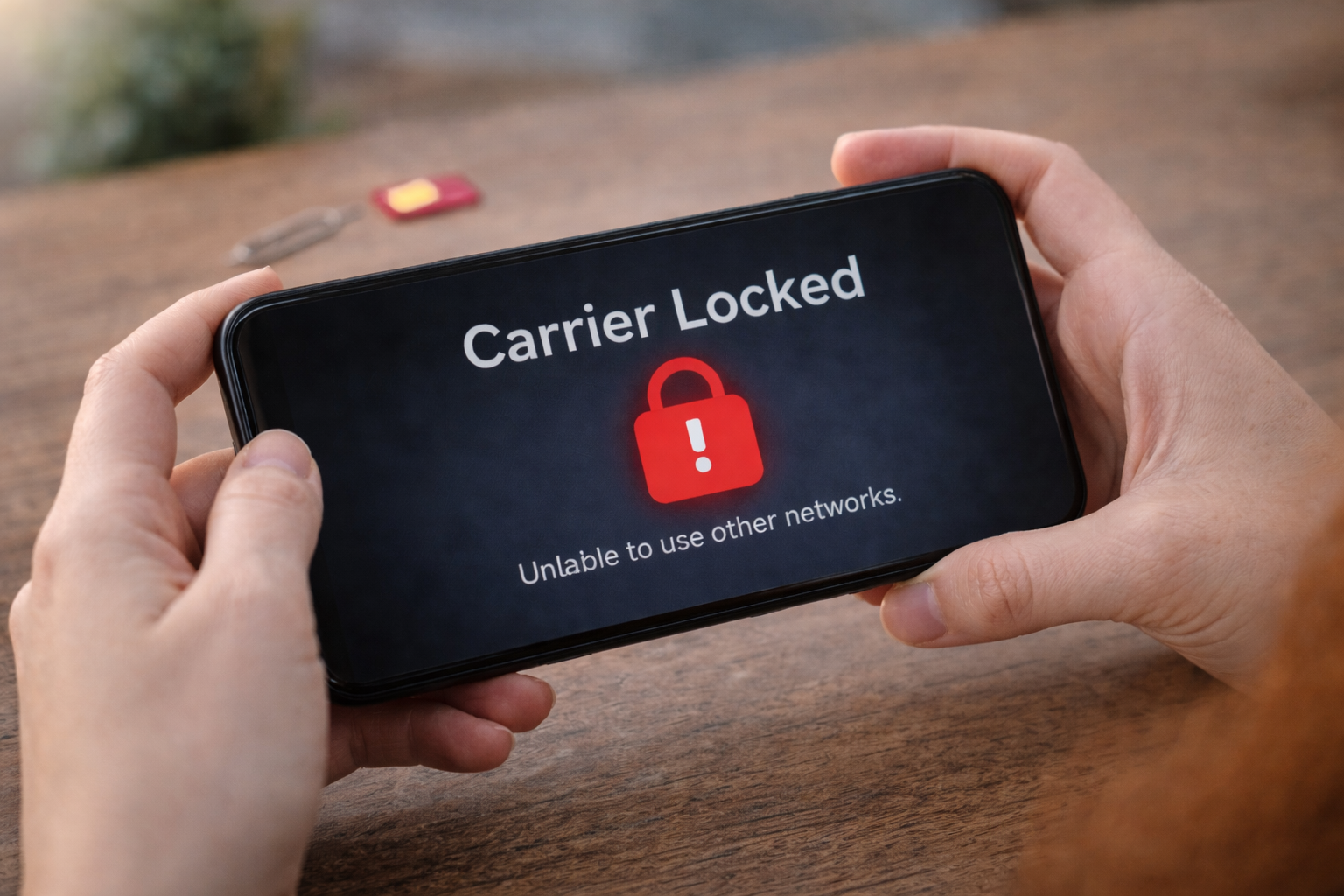Locked vs. Unlocked Phone: What Are the Limitations?

When you start to shop for a new phone, you’ll immediately be presented with a major question: locked or unlocked?
In truth, the differences between locked vs. unlocked phones can be significant, affecting the kinds of carriers you can work with, the kinds of apps you can use, and other elements of your phone’s functionality. Today, we’ll break down the limitations of locked and unlocked phones in detail, including their potential advantages and disadvantages.
What Is a Carrier-Locked Phone?
Alocked phone is a phone secured by one or more pieces of software that have two functions:
- Prevents users from having full access to the phone’s code, which limits the kinds of apps that the user can download and use
- Prevents users from using a specific mobile device with another carrier
The majority of phone carriers that sell new phones sell locked mobile devices. This prevents customers from breaching their contracts and using a newly purchased smartphone, for example, with another carrier instead.
Most iPhones and Android cell phones are locked smartphones. These phones are locked to service providers who keep customers on their mobile networks for a certain amount of months or years. The primary networks that offer locked devices are Verizon, T-Mobile/Sprint, and AT&T.
What Is an Unlocked iPhone or Android?
Anunlocked phone is the opposite of a locked phone. It doesn’t have any software that limits functionality or what apps a person can use. Furthermore, unlocked phones can be purchased anywhere and can be used with any carrier company.
Rather than relying on software to ensure that users only use a specific prepaid phone with a specific GSM network, carriers provide phones with SIM cards that enable phone service on a specific line. Unlocked smartphones don’t lock customers into a contract for a certain number of months or years.
While unlocked phones offer additional functionality and freedom, they also aren’t as secure as locked phones. Furthermore, there’s nothing stopping a user from accidentally misusing an unlocked phone or downloading a harmful app.
Key Differences Between Locked vs. Unlocked Phones
There are several major differences between locked and unlocked phones.
For starters, locked phones have limited usability compared to unlocked phones. When you buy a locked phone, the mobile device is typically locked, so it only works on one carrier. In the worst-case scenarios, locked phones prevent you from downloading just any mobile app; they require you to download apps from an approved application store, like the Apple App Store or the Google Play Store.
Furthermore, the internal antennas for locked and unlocked phones are different. When you purchase a locked phone from a carrier company, it typically only comes with antennas that the specific carrier uses to transmit cellular signals. Therefore, even if you were to unlock a locked phone via software, it might not work on another carrier’s network if it doesn’t have the right antenna.
Aside from this, unlocked phones and locked phones might have different displays, operating systems, and core features. Locked phones usually have more flexibility so that they may have different versions of core operating systems. This can make them better or worse for certain things, like taking photos, surfing the web, and so on.
Locked phones are more limited in terms of the version of the software they use. A locked phone will always be sold with the most recent version of the OS it runs on (and that its hardware can support).
Upsides of Buying a Locked Phone
So, why would you purchase a locked phone in the first place? In truth, there are lots of benefits to purchasing a locked phone.
For starters, locked devices usually cost less than unlocked devices. That’s because wireless network carriers subsidize the retail cost of phones by guaranteeing that you’ll stick with them for the duration of the contract, like two years.
Many carriers these days spread out the cost of purchasing a new phone over several years via payment plans. This can be financially advantageous as it puts all of your bills on one monthly fee.
Furthermore, purchasing a locked phone gives you access to customer support from the carrier who sold it. You can visit any of the carrier’s retail stores for customer support regarding battery replacements, technical support, and other issues. Plenty of carriers also offer repair services if your device has defects or requires a new part, like a new screen.
Carriers offer insurance plans with locked devices in many cases. Of course, if you unlock the phone after purchasing it, you will likely void the terms of the warranty agreement and not be able to take advantage of it.
Downsides of Buying a Locked Phone
That said, there are downsides to purchasing a locked phone as well. For example, you cannot switch carriers whenever you like. If you want to switch carriers, you'll need to purchase an entirely new phone (particularly if your current phone has a very limited antenna, as described above).
On top of that, purchasing a locked phone means you can’t download and use every app you think is interesting. You’ll only be allowed to use and download apps that are approved by your carrier or the manufacturer. This can be a pain if you are required to download a specific app for work or some other purpose, but the app hasn’t been verified on your carrier’s approved app store.
Should you purchase a locked phone, you might not be able to take advantage of deals offered by different carriers. Even with the above-mentioned discounts, locked phones can be very expensive in some cases. Things can get even pricier if you’re locked into a contract or practically forced to purchase a specific phone to avoid heavy fees.
Advantages of Unlocked Phones
You might want to purchase an unlocked phone – orunlock your locked phone – for a variety of reasons. For example, your freedom is much greater on an unlocked phone compared to a locked phone.
Unlocked phones let you switch carriers whenever you like, meaning you don’t have to purchase a brand-new phone every time you want to swap out your cell service. You can just remove your phone’s SIM card and replace it with a new card from your new carrier.
Most unlocked phones also support both GSM and CDMA networks. This enables you to connect to any wireless carrier worldwide. With an unlocked phone, you can try as many different carriers as you like (provided they offer month-to-month phone plans).
In addition, unlocked phones are oftentimes easier to sell or trade-in because they have higher resale value. Because of the inherent freedom in unlocked phones, you can usually get more credit or a better selling price for these devices compared to limited locked phones.
Lastly, unlocked phones allow you to use whatever apps or software you like without any limitations. Therefore, you aren’t just limited to the approved apps on your seller’s app store.
Disadvantages of Unlocked Phones
Unlocked phones do come with some notable downsides. You have to do a detailed check to make sure that your chosen device supports all the radio bands used by your local carriers. This can be tricky if you are trying to purchase and ship a phone from outside the US, such as buying an Android phone on Amazon.
If you purchase an unlocked phone, you are responsible for making sure all the software and apps you download are safe. Since some apps aren’t verified by app stores, it’s easier than you may think to download an app with one or more phone malware viruses. If you download the wrong app, you could compromise your personal information or ruin your mobile device altogether.
Unlocked phones also aren't alwaysavailable with payment plans. Because of this, you might find an excellent unlocked phone but be required to pay the retail price upfront and in full. Given the fact that many modern smartphones can run you several thousand dollars, this is no small ask.
Finally, unlocked phones don’t come with insurance policies the same way that locked phones do. If your phone is damaged in some way, you might find it difficult to get replacement parts for repair work for the device without paying very heavy fees (if you are able to repair it at all).
Unlocked Phones With Red Pocket
Now you know the upsides and potential limitations of using a locked vs. unlocked phone. As you can see, it's a personal decision you'll have to make based on the potential benefits you might see, given your usual phone use habits.
When you purchase a phone from Red Pocket with mobile service, however, you can get the best of both worlds.
For the first 12 months of your Red Pocket service, your phone will remain locked. After 12 months of continuous service, you cansubmit an unlock request to unchain your phone in all of its capabilities.Check out Red Pocket’s mobile devices today!
Sources:
What you need to know about unlocked phones vs. locked phones | CNET
Definition of locked phone | PCMag
How to Unlock Your Phone From Any Major Carrier | Consumer Reports

